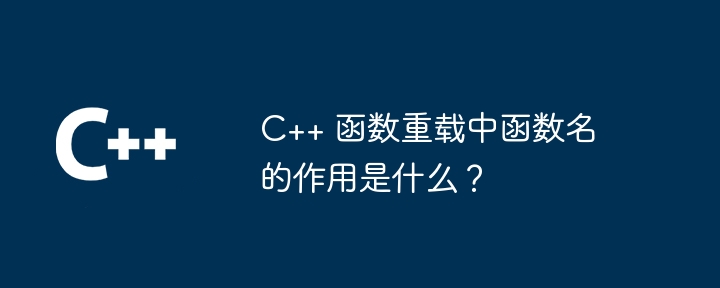
In C, the function name plays a role in distinguishing overloaded functions. Each overloaded function has a unique function signature (including function name and parameter list), and the compiler determines which function to call based on the signature.

The role of function names in C function overloading
In C, function overloading allows you to create new files with the same name But multiple functions with different parameter lists. The function name is used to distinguish these functions among overloaded functions.
Principle
Each overloaded function has a unique function signature, which consists of the function name and parameter list. The compiler uses function signatures to determine which function is called in a specific call.
Syntax
The syntax of overloaded functions is as follows:
returnType functionName(parameterList) {
// 函数体
}Among them:
returnType is the return type of the function. functionName is the name of the function. parameterList is the parameter list of the function, including parameter types and names. Practical case
Consider the following overloaded functions for calculating area:
// 计算面积的重载函数 double area(int width, int height); double area(double radius);
The first function calculates the area of a rectangle, The second function calculates the area of the circle. Although the two functions have the same name, they have different parameter lists. The compiler will determine which function to call based on the arguments provided when calling.
Usage Example
The following code uses these two overloaded functions to calculate the area of a rectangle and the area of a circle:
int main() {
int width = 10;
int height = 20;
double radius = 5.0;
// 计算矩形的面积
double rectArea = area(width, height);
// 计算圆的面积
double circleArea = area(radius);
// 打印结果
std::cout << "矩形面积:" << rectArea << std::endl;
std::cout << "圆形面积:" << circleArea << std::endl;
return 0;
}Output
矩形面积:200 圆形面积:78.5398
The above is the detailed content of What is the role of function name in C++ function overloading?. For more information, please follow other related articles on the PHP Chinese website!
 What are the differences between c++ and c language
What are the differences between c++ and c language
 Recommended learning order for c++ and python
Recommended learning order for c++ and python
 Cost-effectiveness analysis of learning python and c++
Cost-effectiveness analysis of learning python and c++
 Is c language the same as c++?
Is c language the same as c++?
 Which is better to learn first, c language or c++?
Which is better to learn first, c language or c++?
 The difference and connection between c language and c++
The difference and connection between c language and c++
 C++ software Chinese change tutorial
C++ software Chinese change tutorial
 Cost-effectiveness analysis of learning python, java and c++
Cost-effectiveness analysis of learning python, java and c++




